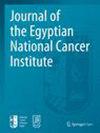Interdependency and differential expression of ERK1 and ERK2 in breast and melanoma cell lines
IF 2.1
Q3 ONCOLOGY
Journal of the Egyptian National Cancer Institute
Pub Date : 2024-09-16
DOI:10.1186/s43046-024-00233-3
引用次数: 0
Abstract
Regulatory mechanism of ERK1 and ERK2, their mechanisms of action, and how they impact on development, growth, and homeostasis of different organisms have been given much emphasis for long. ERK1 and 2 though are isoforms of ERK mitogen-activated protein kinase but are coded by two different genes MAPK3 and MAPK1 respectively and show differential expressions and interdependency in different cancer cell lines. Our previous investigations substantially stated the effect of ERK1 and ERK2 on different extracellular molecules like MMPs and integrins, responsible for cell growth and differentiation. Here, we aim to study individual roles of ERK1 and ERK2 and their interdependency in progression and invasiveness in various cancer cell lines. Different cancer cell lines namely B16F10 (melanoma), MCF7, and MDAMB231 (breast cancer) for studying this particular question were used. Methodologies like gelatin zymography, immunoprecipitation, Western blotting, cell invasion assay, wound healing assay, siRNA transfection, and double transfection procedures were followed for our study. Our findings suggest compensation for ERK2 deficiency by pERK1, clear ERK2 predominance in MCF7 cell line, ERK1-ERK2 interdependency in MDAMB231 cells with regard to compensating each other, and significant role of both ERK1 and ERK2 in modulation of MMP9. If summarized, our results prove the contribution of ERK2 in compensating ERK1 loss and vice versa and an evident role of ERK1 in cancer cell invasiveness.ERK1和ERK2在乳腺癌和黑色素瘤细胞系中的相互依存和差异表达
长期以来,ERK1 和 ERK2 的调控机制、作用机制以及它们如何影响不同生物体的发育、生长和稳态一直备受关注。ERK1和ERK2虽然是ERK丝裂原活化蛋白激酶的同工型,但分别由两个不同的基因MAPK3和MAPK1编码,在不同的癌细胞系中表现出不同的表达和相互依存关系。我们之前的研究充分说明了 ERK1 和 ERK2 对不同细胞外分子(如 MMPs 和整合素)的影响,这些分子负责细胞的生长和分化。在此,我们旨在研究ERK1和ERK2在不同癌细胞株的进展和侵袭性中的各自作用及其相互依存关系。我们使用了不同的癌细胞株,即 B16F10(黑色素瘤)、MCF7 和 MDAMB231(乳腺癌)来研究这一特定问题。我们的研究采用了明胶酶谱法、免疫沉淀法、Western 印迹法、细胞侵袭试验、伤口愈合试验、siRNA 转染和双转染程序等方法。我们的研究结果表明,pERK1能补偿ERK2的不足,ERK2在MCF7细胞系中明显占优势,ERK1-ERK2在MDAMB231细胞中相互依赖,相互补偿,ERK1和ERK2在调节MMP9中都起着重要作用。综上所述,我们的研究结果证明了ERK2在补偿ERK1损失方面的贡献,反之亦然,而且ERK1在癌细胞侵袭性中的作用显而易见。
本文章由计算机程序翻译,如有差异,请以英文原文为准。
求助全文
约1分钟内获得全文
求助全文
来源期刊
CiteScore
3.50
自引率
0.00%
发文量
46
审稿时长
11 weeks
期刊介绍:
As the official publication of the National Cancer Institute, Cairo University, the Journal of the Egyptian National Cancer Institute (JENCI) is an open access peer-reviewed journal that publishes on the latest innovations in oncology and thereby, providing academics and clinicians a leading research platform. JENCI welcomes submissions pertaining to all fields of basic, applied and clinical cancer research. Main topics of interest include: local and systemic anticancer therapy (with specific interest on applied cancer research from developing countries); experimental oncology; early cancer detection; randomized trials (including negatives ones); and key emerging fields of personalized medicine, such as molecular pathology, bioinformatics, and biotechnologies.

 求助内容:
求助内容: 应助结果提醒方式:
应助结果提醒方式:


